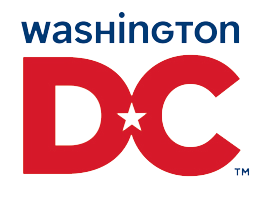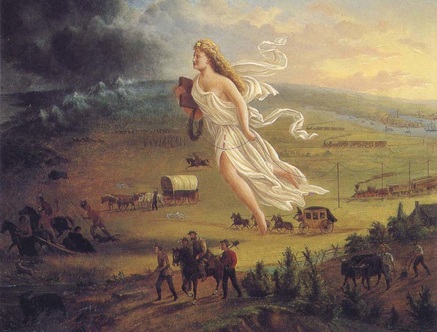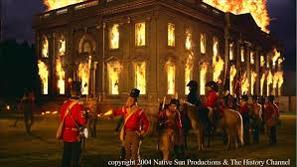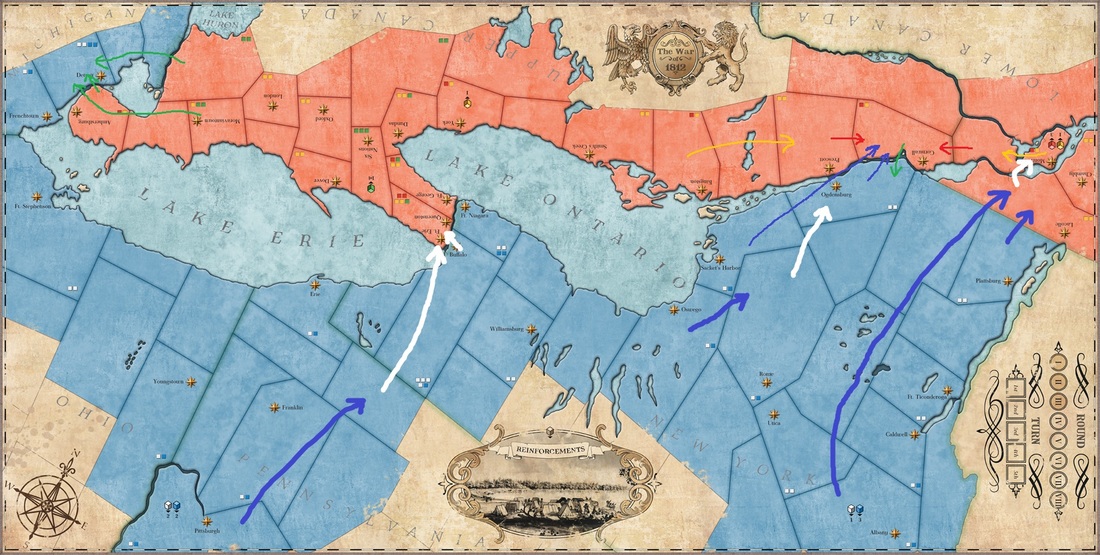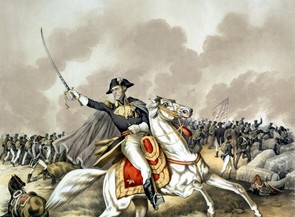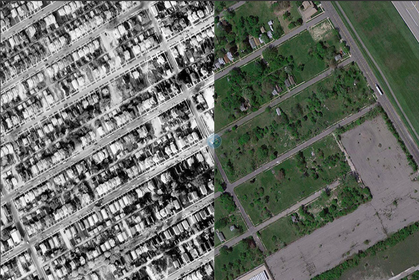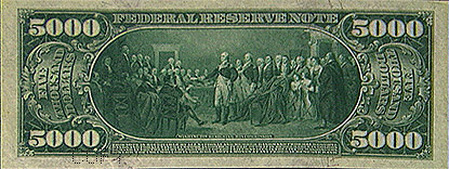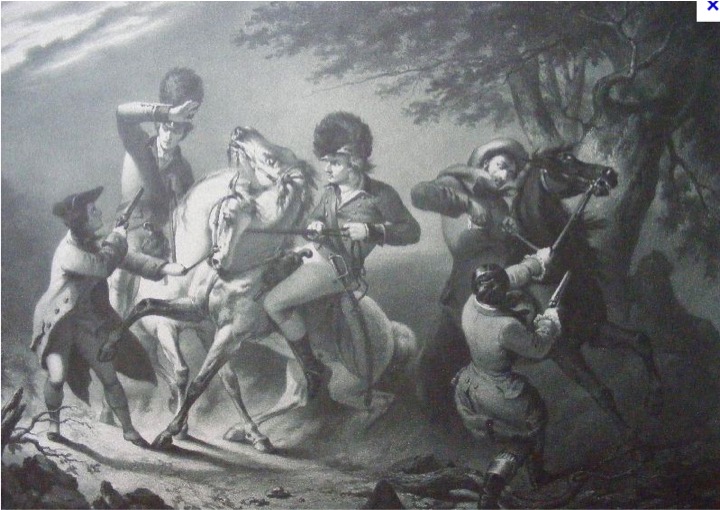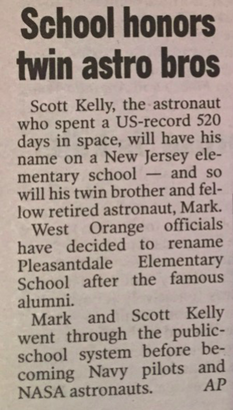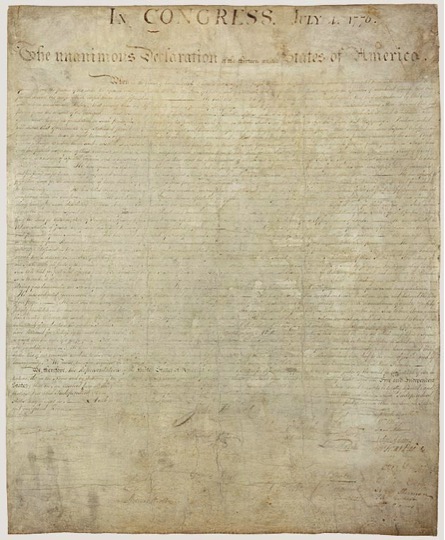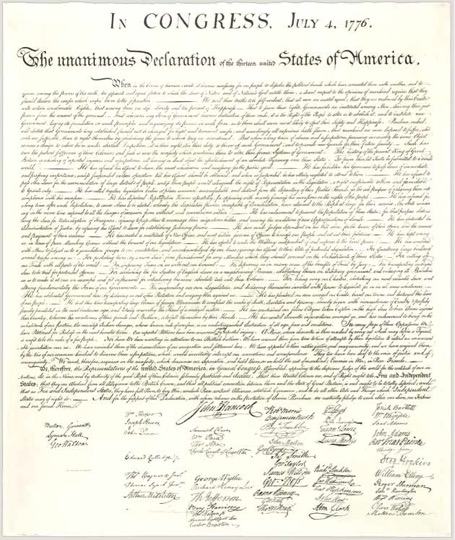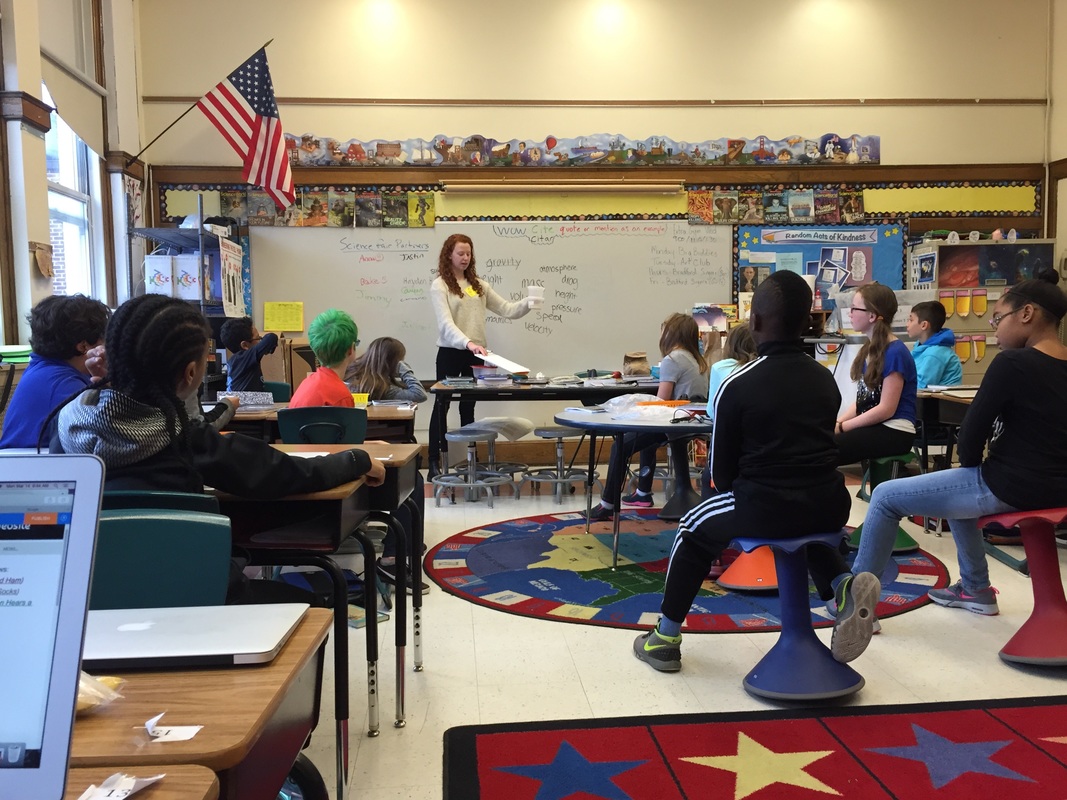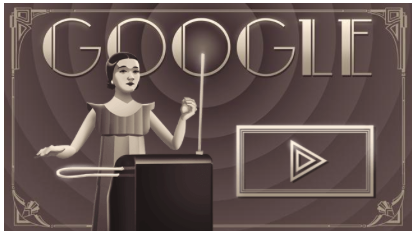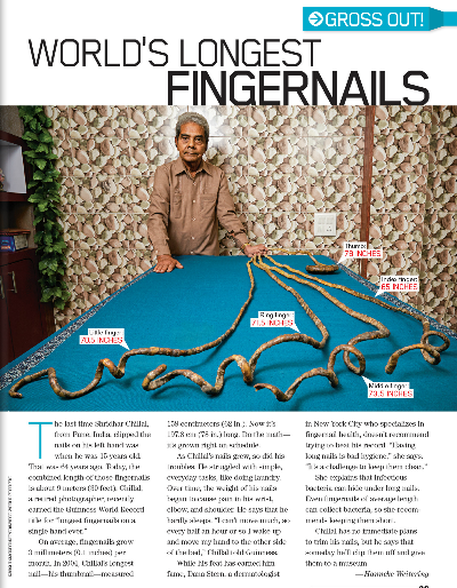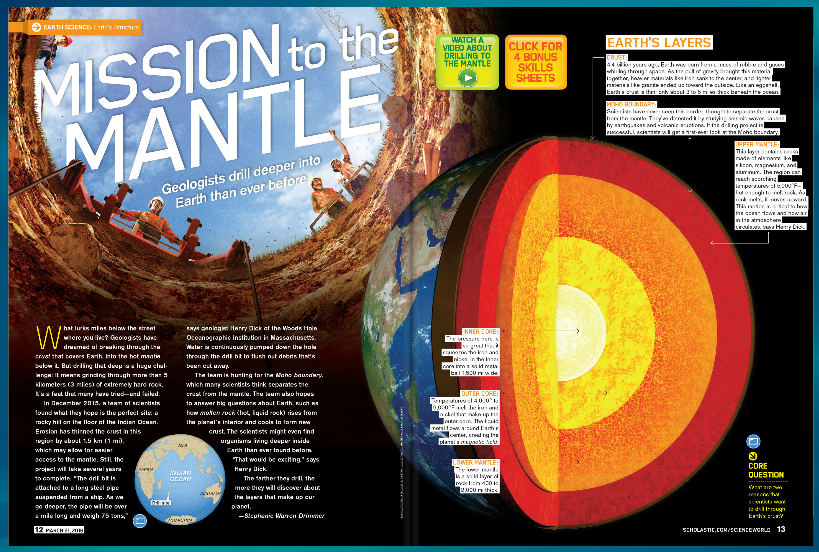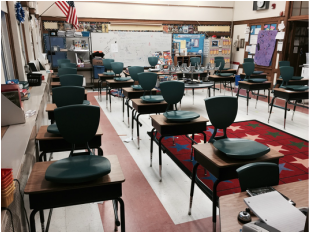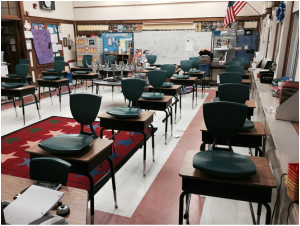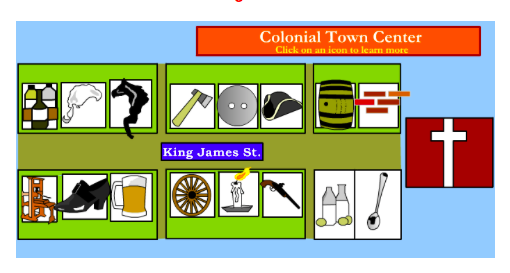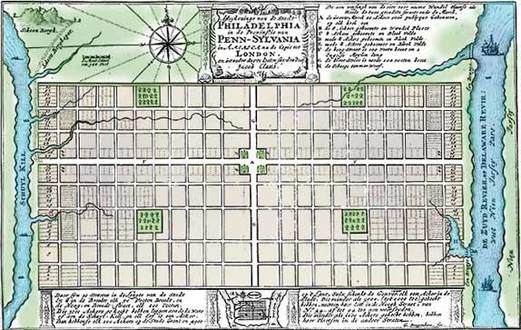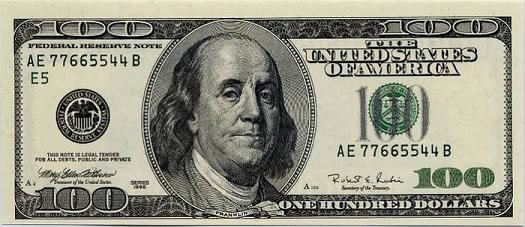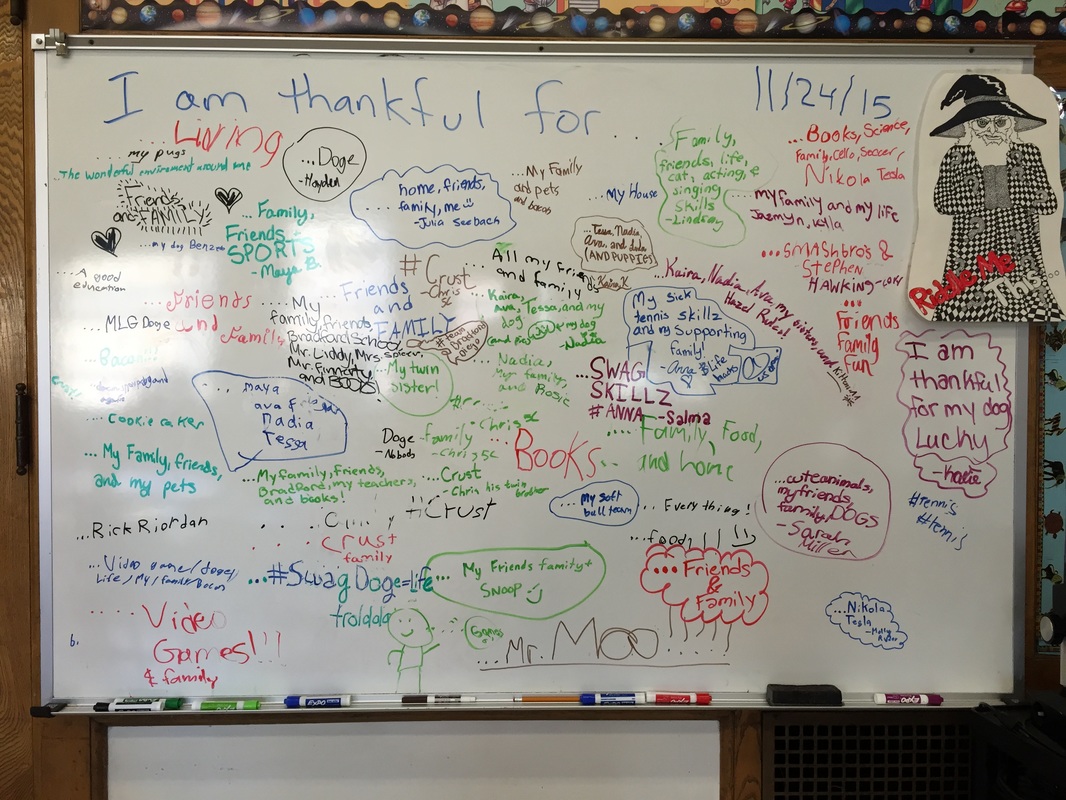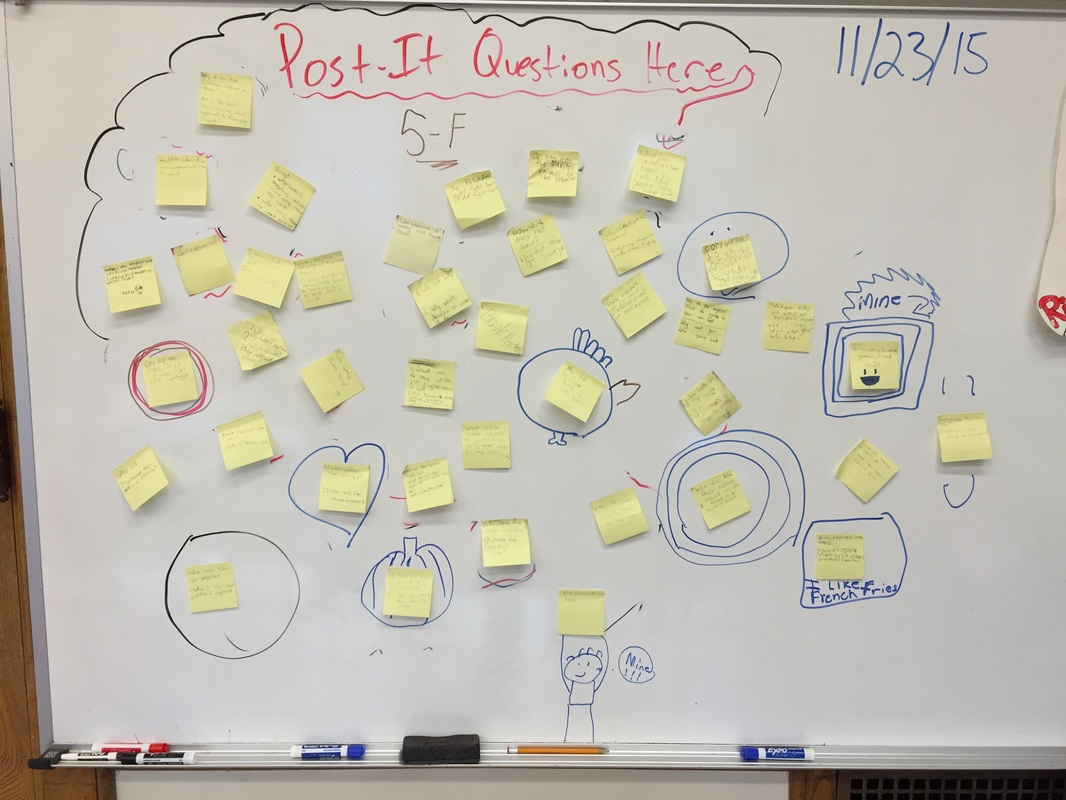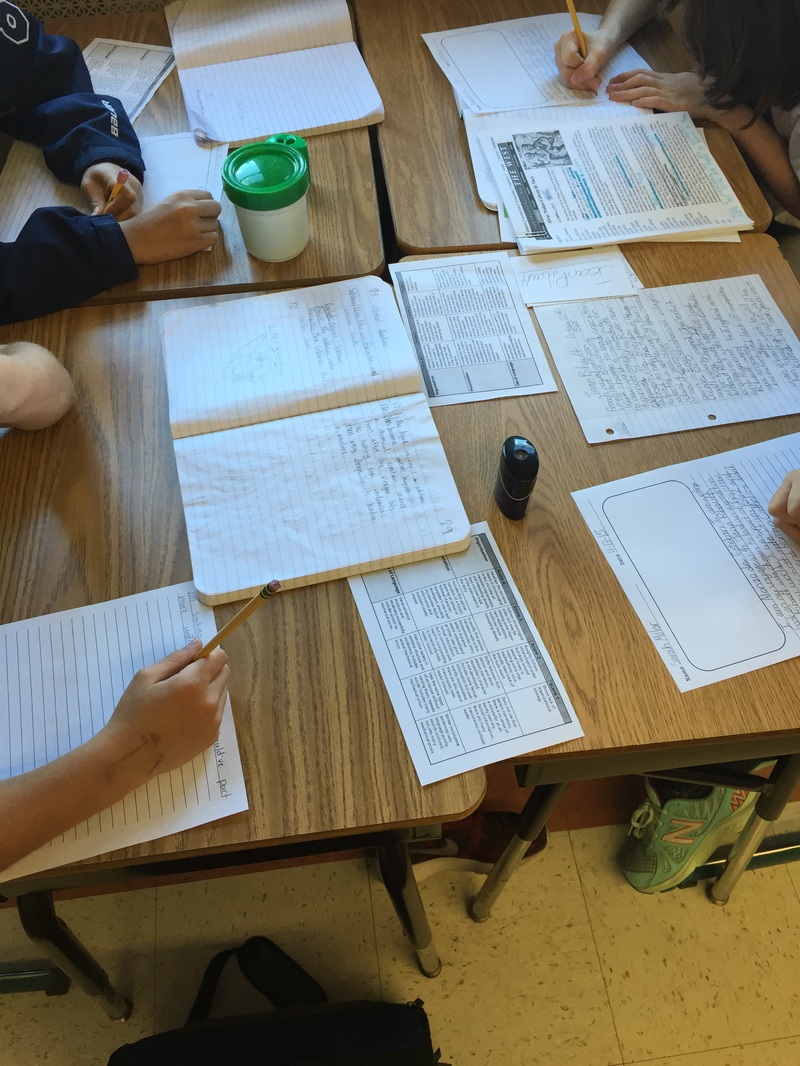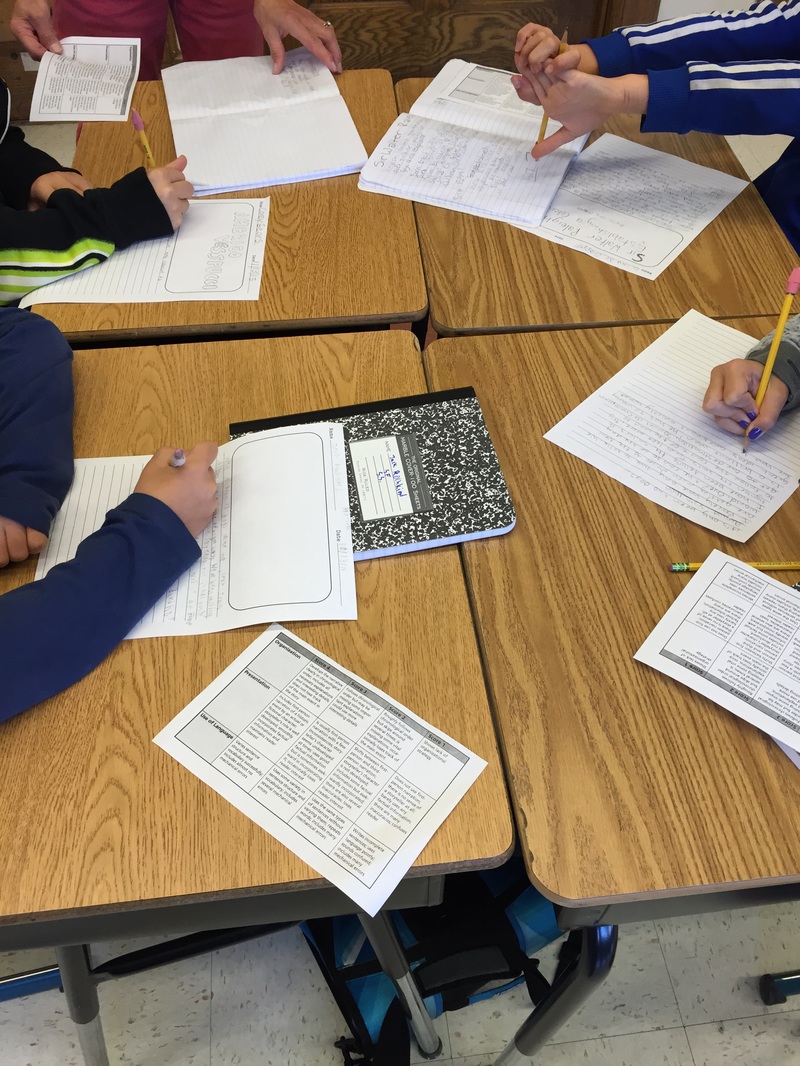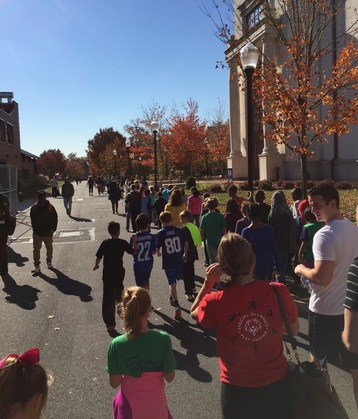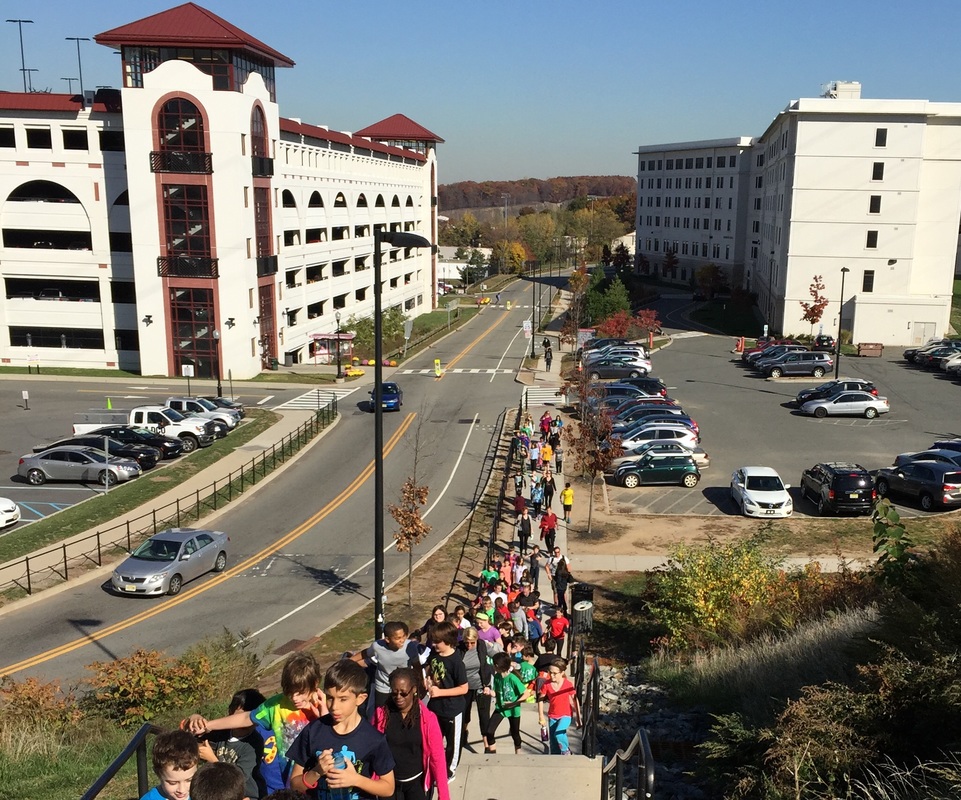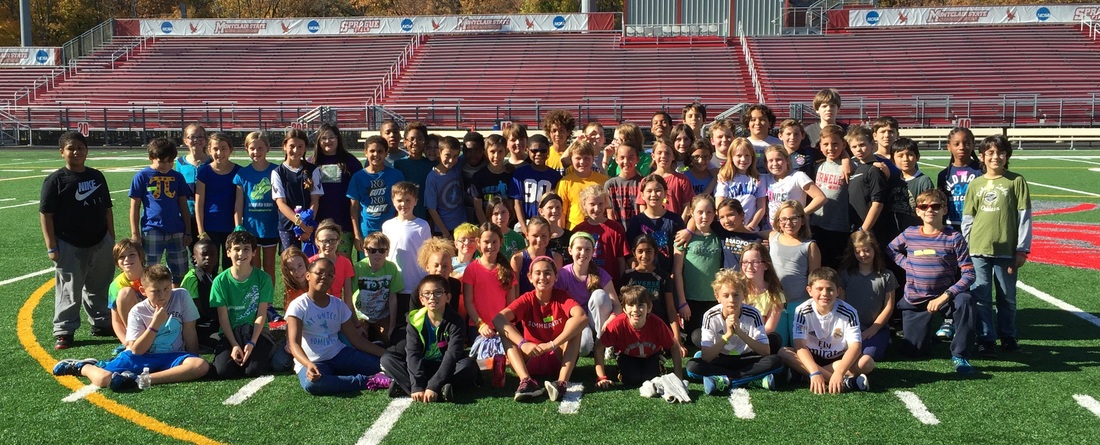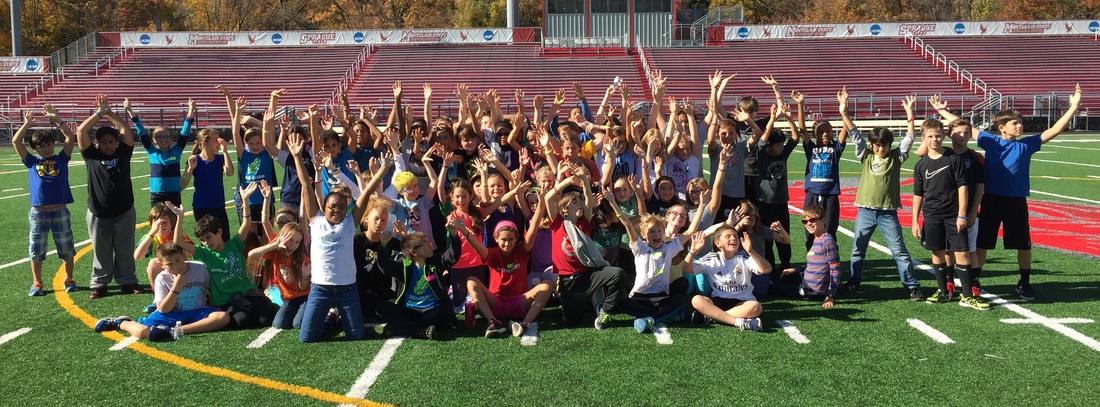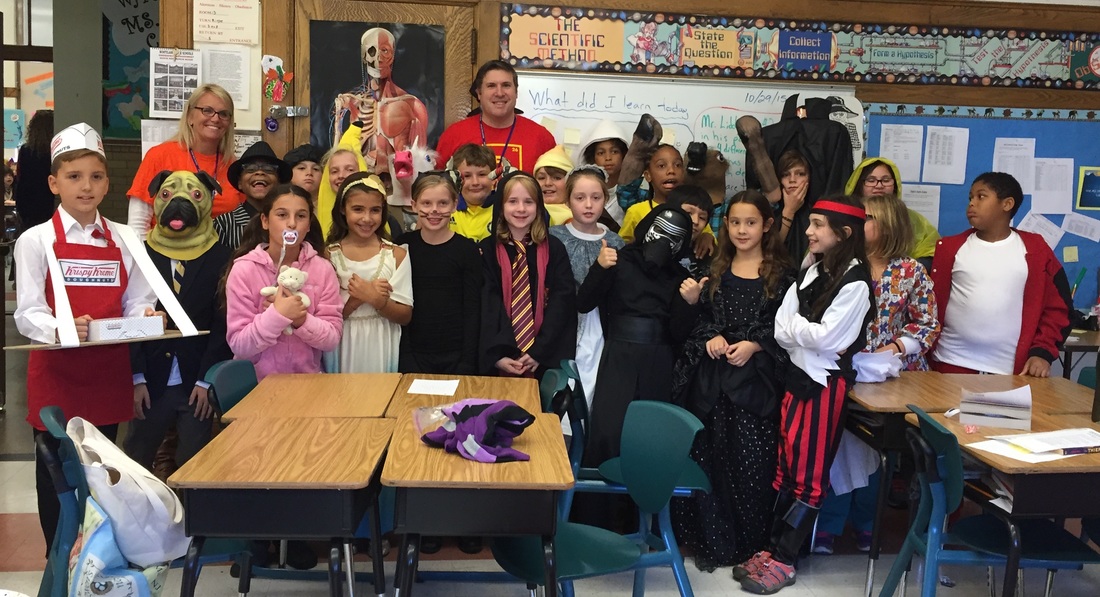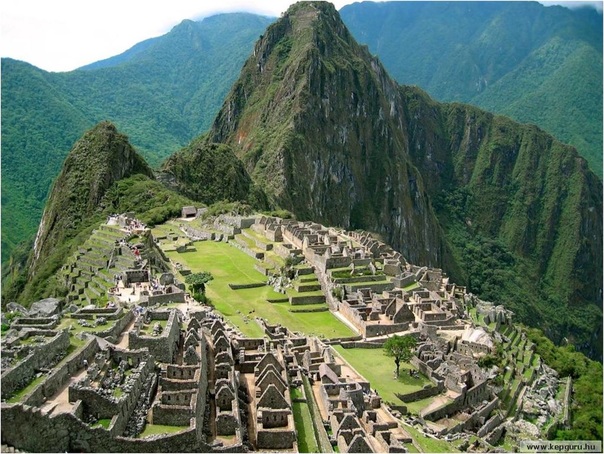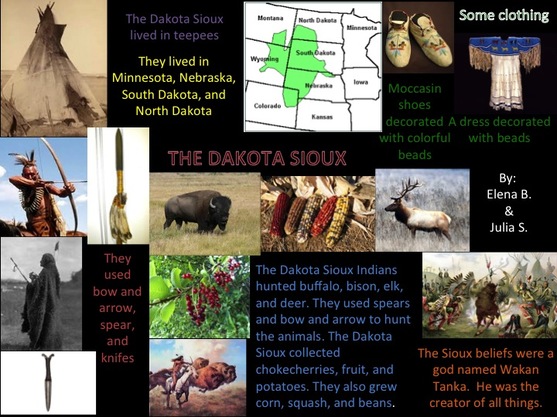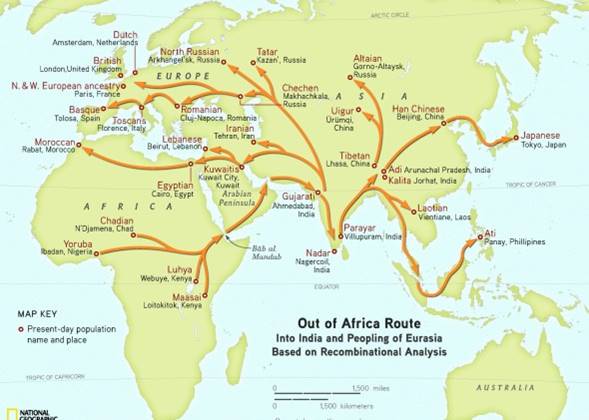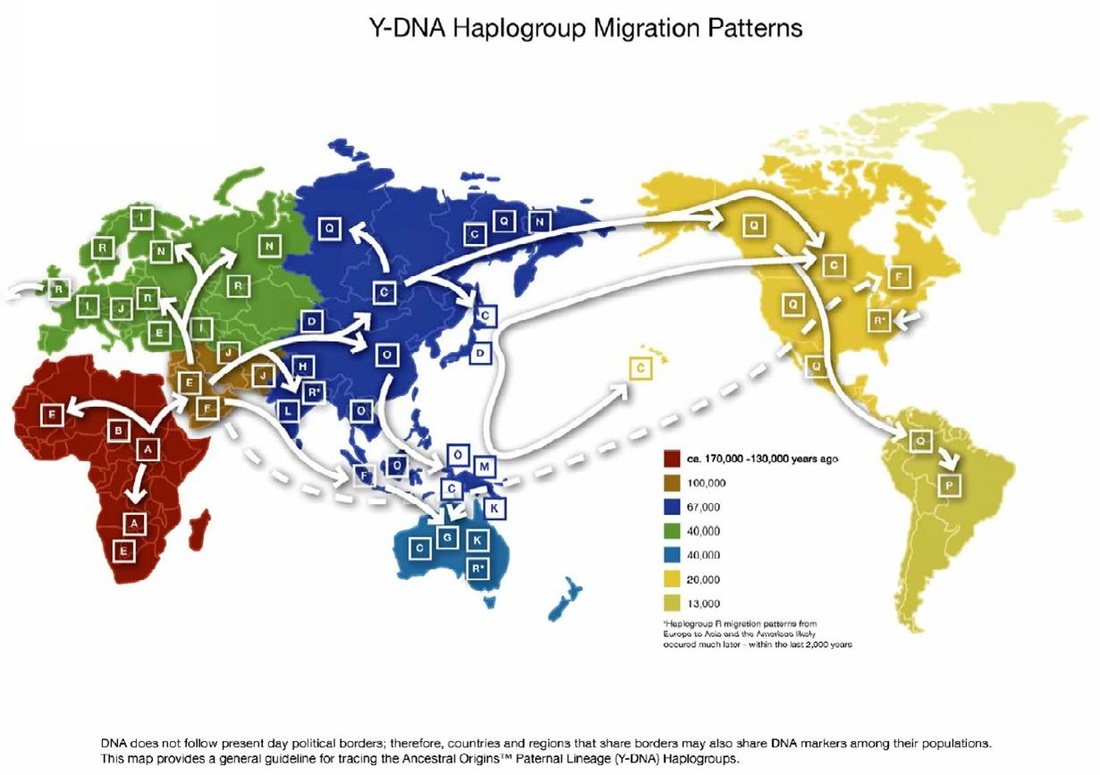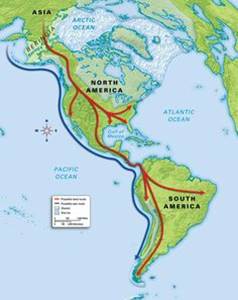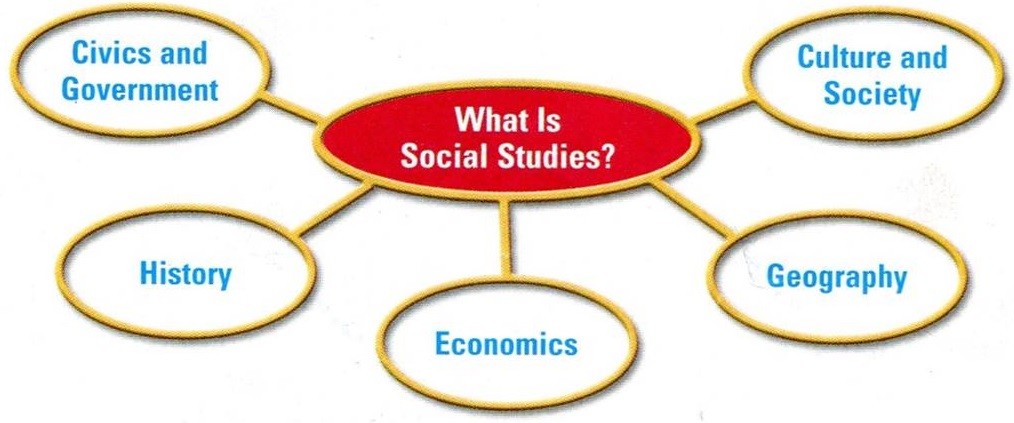Tuesday, June 21st - The kids had a build off today, but it was a little different... The kids sitting on the chair had their hands in the box, but couldn't see the pieces. The kid on the stool had a picture of the finished piece, but could see in the box. The other student(s) in the group could see in the box, but couldn't see the picture or touch the pieces. Is it even possible? I wasn't sure, but it sounded like something I would like to try! The kids did a great job. Below are some pictures of their process...
Monday, June 20th - 13th, 14th and 15th Amendments were covered in course of learning about Reconstruction. This is it. Social Studies is done. We have made it from the Early People, the Age of Exploration, the English Colonies, the American Revolution, a New Nation to the Civil War. We covered a couple of thousand years, learned a bunch and had fun doing it!
Friday, June 17th - Graduation!!!
|
Thursday, June 16th - The students recited the Gettysburg Address in a round robin fashion... I think it went well. We closed out the Civil War with a look at the battles of Vicksburg, Chancellorsville and Gettysburg. Sherman's March to the Sea and the surrender of Richmond. Talk about wild coincidences... officers are looking for a house for Lee to surrender to Grant. A small hamlet called Appomattox Court House is picked and the officers ask the first person they see for a place to use. Mr. McLean shows them just about everything in town and none are good enough. Finally, he shows them his house... perfect. Here is the coincidence... four years
|
earlier Mr. McLean lives in a small town called Manassas Junction. Behind his house there is a small stream called Bull Run. This is to be the place of the first battle of the Civil War. His house is used as a Confederate headquarters, his barn a makeshift hospital/prison, his detached kitchen blown up. He moves 120 miles to get away from the war... only for the war to find him again.
Wednesday, June 15th - Still fighting the Civil War, but the end is near.
Tuesday, June 14th - The students found out there is a lot to know about our flag. Today is flag day, so we talked about our flag and watched a short video on its history. In class... the Civil War fighting has begun at the First Battle of Bull Run or as the Confederates called it... the Battle of First Manassas. We also read about the divisions of families and friends.
Monday, June 13th - Science and Social Studies Post-Assessments. This is not for report cards, but to see show that I taught something and the kids learned something. I will post an overall average tomorrow, but the students won't get any individual score.
A couple of students create Kahoots!, so we played those with the extra time. One was about country capitals (not something we covered in class) and the others were more overview of the year and trivial facts thrown out during classes. Thanks to Julia H., Julia S. and Anna B. for the extra work they put in at home to create these.
A couple of students create Kahoots!, so we played those with the extra time. One was about country capitals (not something we covered in class) and the others were more overview of the year and trivial facts thrown out during classes. Thanks to Julia H., Julia S. and Anna B. for the extra work they put in at home to create these.
Friday, June 10th - The kids had a great time running in their last Bradford Run-A-Thon and a bunch of students helped out Mr. M with the other classes. We couldn't have asked for a better day. Class was somewhat disrupted, but we still got a lot of good work in and watched an American Ride video... Different Visions,Different Dreams. This is a great series... click here.
Thursday, June 9th - The Union Breaks apart. Lincoln wins the presidency and South Carolina secedes, even thought Lincoln says he will not end slavery. It is complicated and I think the students have a better understanding about why events happened the way the did. We ended the day with Fort Sumter surrendering, Lincoln raising an army of 75,000 men and the final four states leaving the Union. A war is now an inevitable and there will be no more comprises over the issue.
Wednesday, June 8th - Slavery and Freedom was the days topic. We learned about the economy of the South and the role slavery played. The students made some new discovers about how the opinion of the North is changing about slavery (run away slaves telling their stories (Harriet Tubman, Fredrick Douglas), Harriet Beecher Stowe's Uncle Tom's Cabin, Nat Turner, slave codes passed by states, the Fugitive Slave Act and John Brown.
Tuesday, June 7th - Coming down the final stretch... heading towards Civil War and Reconstruction. Today we set the stage for war. Slavery has been an unresolved problem from the beginning. Compromises have been made along the way, but they are not solutions. We left off at the point which everyone sees that there are no compromises left and war is inevitable. Check out the two new videos on the Missouri Compromise and the Compromise of 1850.
Wednesday, May 18th - Test tomorrow on A New Nation. Check out science to see what happened today.
Here are the students Washington DC projects. They were given about 1 hour to research and create a few slides. The next time you go to Washington DC... you can preview the sites before leaving!!!
|
Washington DC Parks
Your browser does not support viewing this document. Click here to download the document.
Washington DC Universities
Your browser does not support viewing this document. Click here to download the document.
|
Project
Washington DC Museums
Your browser does not support viewing this document. Click here to download the document.
|
Washington DC Memorials
Your browser does not support viewing this document. Click here to download the document.
Washington DC Buildings
Your browser does not support viewing this document. Click here to download the document.
|
Tuesday, May 17th - We finished the A New Nation unit and will have our test on Thursday. I will be out on Thursday (ELA professional development), so the kids won't miss too much instructional time. If your child is familiar with their notebook and their answers from Kahoot!, they will be in great shape.
Monday, May 16th - KAHOOT! We reviewed for our test on Thursday with a Kahoot!. The kids couldn't have had more fun (and they did a lot of learning... but don't tell them). We also started looking at our solar system. Hoover over the "Science" tab and click on "Solar System" to check out the links.
Here is the Kahoot! link... Kahoot!
Here is the Kahoot! link... Kahoot!
|
Friday, May 13 - The class today could be summed up in two words... Manifest Destiny. We found out what that means and how it was fulfilled.
It was a full day! |
American Progress, an 1872 painting by John Gast
|
Thursday, May 12th - The Era of Good Feelings comes to end in end with President Monroe. The country has had a good run and is doing very well. Monroe even feels good enough about the country that he tells the rest of the world to stay out of the America's... no more colonization. He is also the last of the founding fathers to be president. After him comes Jackson who is nothing like the previous presidents...
He was not wealthy.
He has no great land holdings.
He was not from Virgina or Massachusetts.
He was not a lifelong politician.
He was not highly educated (not in school, but he did become a lawyer and judge).
He was a "common man".
The country is changing. Jackson believes that all citizens should participate in government (Jacksonian Democracy). Voting has been expanded to all white men (just land holding white men could vote before this). It seems like not much of a difference, but it is a step to getting the vote for all Americans. Jackson is also the president who signs and enforces the Indian Removal Act (all Native Americans East of the Mississippi must move to the Indian territory). The last phase is the forced removal of the Cherokee that are marched 800 miles. Cold, disease, and lack of food leads to the death of over 4,000 Cherokees. It becomes know as the "trail of tears".
He was not wealthy.
He has no great land holdings.
He was not from Virgina or Massachusetts.
He was not a lifelong politician.
He was not highly educated (not in school, but he did become a lawyer and judge).
He was a "common man".
The country is changing. Jackson believes that all citizens should participate in government (Jacksonian Democracy). Voting has been expanded to all white men (just land holding white men could vote before this). It seems like not much of a difference, but it is a step to getting the vote for all Americans. Jackson is also the president who signs and enforces the Indian Removal Act (all Native Americans East of the Mississippi must move to the Indian territory). The last phase is the forced removal of the Cherokee that are marched 800 miles. Cold, disease, and lack of food leads to the death of over 4,000 Cherokees. It becomes know as the "trail of tears".
|
Wednesday, May 11th - "What goes around comes around" is fitting for our lesson today, because we burned the capital of Canada (York - later named Toronto) and the British came and burned Washington DC. That is correct, we are studying the War of 1812. We learned about some the causes (impressment of American merchants by the British on the high seas and forts in the west still occupied by British soldiers) and where the war was fought (the sea battles on the Great Lakes and our invasion of Canada, the burning of Washington DC, the most lopsided victory in American history that introduced the world to Andrew Jackson... Battle of New Orleans and the battle of Baltimore... defense of Fort McHenry). This is a great link to the Star Spangled Banner (the big flag from Fort McHenry)... FLAG
|
We watched two videos this week made by "the biker guy". The kids really like the way he presents the material and he covers a lot of topics... maybe 100 episodes? PS.. I was watching him before I was teaching, so I like his show also
Click here to open the link... Show then click on "list view" to see all the episodes.
Click here to open the link... Show then click on "list view" to see all the episodes.
Tuesday, May 10th - So... Thomas Jefferson bought some land from the French... 828,000 square miles (Louisiana Territory), but it was like buying a house without ever seeing it. What is there? Is it fit for people to make it home? Lewis and Clark are giving the impossible task of mapping the new land and seeing if they can find a water route to the Pacific. 18 months after leaving St. Louis they arrive at the Pacific. It can be compared to our moon shot 160 years later.
Monday, May 9th - Computers! It has been a while since we have had the computer cart, so today was a research day. The students individually created a short document about a location, building, monument... in Washington DC. Their work will be pieced together to create a Washington DC Guide. It should be pretty cool... we should have something to show by the middle of the week.
Friday, May 6th - The country grows! Thomas Jefferson is our third president and for only $15,000,000 he purchases the Louisiana Territory (800,000 square miles) from the French. Was it a good deal? Some thought so. Others thought it was a lot of unexplored and unneeded land. With our 2016 glasses, we can see that it was a great deal!
The kids got to hear a couple of stories about why we didn't want a king or queen. Ask them to tell you about a day in the life of King Charles IV of Spain or dinner with King Louis XVI.
We also look at what happens to a house that is not taken care of... the White House 1950... total gut job...
The kids got to hear a couple of stories about why we didn't want a king or queen. Ask them to tell you about a day in the life of King Charles IV of Spain or dinner with King Louis XVI.
We also look at what happens to a house that is not taken care of... the White House 1950... total gut job...
Thursday, May 5th - We finished up our discussion about the Bill of Rights and moved onto the beginning of the new government. We learned why March 4, 1797 was such an important day in history... we change leaders by means of a peaceful election! Lot's of new videos...
Wednesday, May 4th - The Constitution has been ratified (fancy word for approved), but it is missing something... how about our rights! We talked about the Bill of Rights and what they mean. There are a couple of good videos, but we couldn't watch them today... no internet. It looks like someone cut the fiber optic cable and knocked a few schools out. The videos are posted.
Here are the signers of the Constitution and the Constitution...
Here are the signers of the Constitution and the Constitution...
Tuesday, May 3rd - What does the Constitution of the USA do for us? Great question... it tells us how the nation should be run. We learned about the three branches of government... legislative, executive and judicial. Since the convention didn't want to create a king, they made sure that each branch had limits (checks and balances).
Monday, May 2nd - The students got their first look into the "Constitutional" Convention. Who was there? What did they expect to happen? What was it like? How was it possible to create this "miracle"?
Friday, April 29th – We started a unit called... A New Nation. When we left our newly independent Americans, the new country was getting ready to start down the unique road of democracy. What could go wrong? The students learned that the government set up by the Articles of Confederation were not working out so well. Sure, the states loved having all the power, but nothing was getting done as a country. Some called the central government a "rope of sand", while others said that was better than a "rope of iron". Your kids should be able to explain this (or might need their notes). We finished the week discussing the Annapolis Convention and their suggestion of asking congress to call another Constitutional Convention. Congress (each state has one vote) does not want to have another convention. The central government is weak and congress will not/can not do anything about it. Shays’ rebellion changes their minds and agree to call the Second Continental Convention. Next week… we will look into what was discussed at this convention and the compromises that were made to create The Constitution of the United States.
Thursday, March 31st - Tomorrow (Friday (4/1) is the Revolutionary War test. You kids should know everything that we covered on the review sheet and give their notes a once over. Do that and the test will be a breeze.
Check out the science tab for what happened in class today.
Tomorrow the Science Fair projects and presentations are due. Don't be late!
Check out the science tab for what happened in class today.
Tomorrow the Science Fair projects and presentations are due. Don't be late!
Wednesday, March 30th - 11 out of 24 out for school tours today... one more day to go. The students seemed excited about all the schools, so I think they will be happy no matter their placement. We reviewed the Revolutionary War and watched a video about the building of the Hoover Dam and the bridge that was built next to it (posted under videos). We stopped about 100 times to discuss why or how the project progressed. There is a point to what we have been doing in class... we are going to start our a unit on engineering, design and modeling. I think the kids are going to love it!
Tuesday, March 29th - We beat yesterday's record with 12 of the 24 students out, but those that were in had no complaints. We went up to Montclair State and checked out the Cali School of Music. SW, one of the students in my homeroom, goes there every weekend to play her cello. She showed us around and we got to see her teacher with other college students practicing. We checked out Panzer (gym) and spent the rest of our time running around on the football field. Surprisingly, we even got some school work in...
|
We talked about the American Revolutionary War test... what will be on it and when it will be. They will be fine if they are familiar with their notebooks and can explain the answers from Monday's worksheet. The test will be on Friday and will be short. here is why... Wednesday - more students will be out again for the school tours. Thursday - the same problem, but throw in an early dismissal and an assembly. Friday - Science Fair projects are due and the students are supposed to present in class. That is why the test will be on Friday and short.
|
There were a few other items we touched on today... we watched a couple of neat videos (making transoceanic fiber optic cables and building a containment unit for Chernobyl). We heard an author interviewed on NPR about the Revolutionary War from the British point of view (Iron Tears). Last part... how water, nature and time will breakdown everything mankind has made... check out Detroit... www.detroiturbex.com
Monday, March 28th - Lots of students (10 out 24 from my homeroom) took advantage of the middle school tours today (it seems like it might be like this for the next few days), so I had to do some adjusting to the lessons. We tried something new today for review... the students worked individually to answer 19 questions. They couldn't use their notebooks or textbooks. I made the students an offer... turn in your sheet and I will grade that and they don't have to take the test. A few students thought about it, but turned down the offer. One student took the offer. I kind of felt bad, because I wasn't sure if they could have answered all the questions correctly. But, a deal is a deal and she made the right choice. She could have been clearly when explaining what made Benedict Arnold a traitor, so she ended up with a 98%. I was more than pleased. Now, when the kids say we never talked about something in class... I have proof that someone heard it!
The big question... when is the test? Good question. I was shooting for Wednesday, but there are so many kids out, it won't work. Thursday is an early closing with an assembly (not enough time), so it looks like Friday.
The big question... when is the test? Good question. I was shooting for Wednesday, but there are so many kids out, it won't work. Thursday is an early closing with an assembly (not enough time), so it looks like Friday.
Ask your child how Montclair is tied to the Revolutionary War... here are a few pictures to help...
Wednesday, March 23rd - The students discovered how Washington turned his army of farmers, merchants and shop keepers into soldiers... Baron Friedrich Wilhelm August Heinrich Ferdinand von Steuben. The kids got a kick out of the fact that he claimed to be so much, but in the end turned out to be a fraud. But that was ok by Washington. He thought it was more important what you could do and not what title you your born with (at least that is what I think). I can't be far off, because Washington did make him the Inspector General of the army (with the rank and pay of a major general).
So what was today all about? Valley Forge and heroes of the war...
Ethan Allen and the Green Mountain Boys: Battle of Saratoga and capturing Fort Ticonderoga
Nathan Hall: American spy that was hung. His last words... "I only regret that I have but one life to lose for my country".
John Paul Jones: After the British naval officers tell him to surrender, because he has no hope... he says... "I have not you begun to fight!". He keeps fighting and the British ships surrender to him.
Francis Marion: The Swamp Fox of South Carolina who led daring raids against the British
George Rogers Clark: Led men to protect the settlers in the frontier lands from British and Indian attacks.
There were plenty of heroic women. The students researched and shared their findings earlier in the week (24 different women that should bravery, skill and honor).
So what was today all about? Valley Forge and heroes of the war...
Ethan Allen and the Green Mountain Boys: Battle of Saratoga and capturing Fort Ticonderoga
Nathan Hall: American spy that was hung. His last words... "I only regret that I have but one life to lose for my country".
John Paul Jones: After the British naval officers tell him to surrender, because he has no hope... he says... "I have not you begun to fight!". He keeps fighting and the British ships surrender to him.
Francis Marion: The Swamp Fox of South Carolina who led daring raids against the British
George Rogers Clark: Led men to protect the settlers in the frontier lands from British and Indian attacks.
There were plenty of heroic women. The students researched and shared their findings earlier in the week (24 different women that should bravery, skill and honor).
Tuesday, March 22nd - The students got to compare the British and Continental Armies or as one student said, "not much of a comparison". The American Revolutionary War is a topic that can fill entire courses, books and even shelves and shelves and shelves of books, but we only have three days. So what to cover? We read, watched and talked about the the early victories that help change the direction of the war. The Battle of Trenton and the Battle of Princeton. Not strategically important, but a morale victory for Washington's army. The Battle of Saratoga was the other battle we focused on, because it was a game changer.... The Continentals beat a large British army and captured almost 6,000 soldiers (the British had about 50,000 soldiers in the colonies). Ben Franklin, over in France, finally had something to show that the Americans could win and that siding with them would not be a lost cause. The British knew that they would not be able to beat the colonists easily (if at all). Lastly... the Continental Army didn't do a lot of winning during the war.
Monday, March 21st - The snow was a bust, so that is the end of winter! We finished presenting our research on women in the Revolution. There are some really great and inspiring stories. I think my favorite are the Martin sisters... Grace and Rachel....
|
One evening intelligence came to them that a courier, conveying important dispatches to one of the upper stations, was to pass that night along the road, guarded by two British officers. They determined to waylay the party, and at the risk of their lives, to obtain possession of the papers. For this purpose the two young women disguised themselves in their husbands' clothes, and being well provided with arms, took their station at a point on the road which they knew the escort must pass. It was already late, and they had not waited long before the tramp of horses was heard in the distance. It may be imagined with what anxious expectation the heroines awaited the approach of the critical moment on which so much depended.
|
The forest solitude around them, the silence of night, and the darkness, must have added to the terrors conjured up by busy fancy. Presently the courier appeared, with his attendant guards. As they came close to the spot, the disguised women leaped from their covert in the bushes, presented their pistols at the officers, and demanded the instant surrender of the party and their dispatches. The men were completely taken by surprise, and in their alarm at the sudden attack, yielded a prompt submission. The seeming soldiers put them on their parole, and having taken possession of the papers, hastened home by a short cut through the woods. No time was lost in sending the important documents by a trusty messenger to General Greene. The adventure had a singular termination. The paroled officers, thus thwarted in their mission, returned by the road they had taken, and stopping at the house of Mrs. Martin, asked accommodation as weary travellers for the night. The hostess inquired the reason of their returning so soon after they had passed, They replied by showing their paroles, saying they had been taken prisoner by two rebel lads. The ladies rallied them upon their want of intrepidity. "Had you no arms?" was asked. The officers answered that they had arms, but had been suddenly taken off their guard, and were allowed no time to use their weapons. They departed the next morning, having no suspicion that they owed their capture to the very women whose hospitality they had claimed.
|
Friday, March 18th - We continued discussing the role of women in the Revolutionary War. The students had done research on different women and had the chance to explain their contributions to the class.
No school next Friday. Maybe... no school on Monday? Check the weather. 1" to 3" predicted, but you never know! We also got confirmation about why changing the name of Mount Hebron is a no brainer... |
Thursday, March 17th - Happy St. Patricks Day! Although I was out, the students still had a full lesson. They did an interesting experiment with ligaments, learned more about the roles of women in the Revolutionary War and read about the travels of the Declaration of Independence.
Wednesday, March 16th - The students learned about the countries new government... based on the Articles of Confederation. These will last throughout the war, but not forever. They also got a better understanding about how the colonists were split on the independence issue and why being on the wrong side (losing) would be bad.
Tuesday, March 15th - What is the Declaration of Independence all about? We learned about what it said and what it meant... and a fun video. I think the kids really got the point of what a big and dangerous step this was when they understood the last line... "we mutually pledge to each other our Lives, our Fortunes and our sacred Honor."
The picture on the left is the original Declaration of Independence... how do you think you would look if you were 240 years old? The picture on the right is what it looked like originally.
The picture on the left is the original Declaration of Independence... how do you think you would look if you were 240 years old? The picture on the right is what it looked like originally.
Monday, March 14th - Our guest/former student started today and will be talking about STEM with the students for a few minutes everyday this week. I asked the students if women played any part in the Revolutionary War and most of the classes came up with nurse. That's it? We talked about other possibilities. The students each got a name to research. The kids were excited once they found out about these women and wanted to tell the class. We will work them into the class work over the next few days... the students will the experts/teachers.
These are a couple of really great Revolutionary War sites for kids... Click here or here
These are a couple of really great Revolutionary War sites for kids... Click here or here
Friday, March 11th - The Second Continental Congress sends the Olive Branch Petition to King Charles III. Just in case that doesn't work, the colonists (at the same time) begin to build an army and navy. It didn't hurt naming George Washington as the Commander-in-Chief of the new Continental Army. The petition was too late and England had already issued a Proclamation of Rebellion. As your child can tell you... "It's too late to apologize". We finished the week with the a great overview of the Declaration of Independence from our favorite history teacher/biker.
Family skate tomorrow at Clary Anderson Arena... see you there...
Take a look at the gift that was waiting for us this morning... Thanks everyone!!!
Family skate tomorrow at Clary Anderson Arena... see you there...
Take a look at the gift that was waiting for us this morning... Thanks everyone!!!
Thursday, March 10th - Ask your kid where the Battle of Bunker Hill took place... It's a trick... Breed's Hill. The colonists prove that they can fight the British and the British realize that fighting the colonists will not be as easy as they had expected.
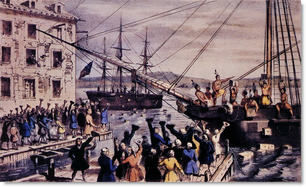
Wednesday, March 9th - Escalation. Between the colonies and Parliament, I think that is the best word to describe what we are investigating. We looked at the Declaratory Act, Tea Act, the Boston Tea Party and Intolerable Acts. The students came up with options that each side could have taken at each step and the consequences. We finished with "the shot heard 'round the world". It looks like after Lexington and Concord, there is no turning back.
|
Today would have been Clara Rockmore's 105th birthday. Yes, that Clara Rockmore, the theremin virtuoso who inspired Led Zeppelin, The Rolling Stones, The Beach Boys and countless others... doesn't ring any bells? Check out the video sections a pair of songs that use this instrument... I am sure you will know these songs. |
Tuesday, March 8th - Taxes. That was the focus of todays class. The colonists are getting them from England and they don't like it! Somethings never change. We picked up from the Proclamation of 1763 and got to the Boston Massacre. Ask your kid if they can tell you the common complaint of the colonists... no representation.
|
Monday, March 7th - We don't have the Science World Magazine in hand, but we do have access to the magazine online. Thanks again to all those who were quick enough to get to support the project. Thanks also to those who wanted to donate, but found the project founded. We read a great article about the "Big Dig". Not the one up in Boston, but though the crust of the Earth. Ask your kids if they can tell you more. If they can't... ask them about the man with the giant finger nails... that was unforgettable. Read about the Big Dig... Click Here / password is... 123Bradford
A big thanks to Peter's mom for sending the following link... Check out what the founding fathers had to say... http://founders.archives.gov/ The kids randomly picked one of George Washington's letters. There were plenty of options... the National Archives has already transcribed over 31,000 of his letters! The students had an individual research project. They were given an act, person or group and had to become the experts on that topic. They will present their new knowledge through out the week as we come to there topic. |
Friday, March 4th - We finished the week at the Proclamation of 1763. England is taking away the colonists rights (settling the land won in the French and Indian War/Seven Year War...that lasted nine years), leaving British soldiers in the colonies and having the colonial governors enforce even stricter laws from a government thousands of miles away. We are working towards the revolution and the students are getting the full picture of why the colonists felt they were being treated unfairly. Next week we will look at the acts/taxes that are the final straw for the colonists.
Interesting tidbit I read to the kids and had them think through and explain the quote...
From A History of US... "Washington and 150 men tried to make them (French in the Ohio River Valley) go. They attacked a French scouting party and killed 10 Frenchmen. An English writer, Horace Walpole, said of the small battle, "The volley fired by a young Virginian in the backwoods of America set the world on fire." It was 1754; the French and Indian War had begun."
Fun fact... Two years after George Washington is defeated at Fort Necessity, he returns with English General Braddock and 1,800 English and Colonial troops. 900 French and Indian soldiers kill or wound two-thirds of the English. The French fire from behind trees and boulders, while the British try to fire in line formation. Braddock is killed. George Washington survives the battle with four bullet holes in his coat and two horses shot from under him. How things would have changed if one of those bullets was a few inches to the left or right. Washington has learned a valuable lesson in the defeat... a smaller force can defeat a larger and better trained one. He probably felt pretty lucky!
Thanks for all the donations. Science World Magazine and the Hokki Stools have been funded. I will update everyone on their use when the come in... the kids can't wait!!!
Interesting tidbit I read to the kids and had them think through and explain the quote...
From A History of US... "Washington and 150 men tried to make them (French in the Ohio River Valley) go. They attacked a French scouting party and killed 10 Frenchmen. An English writer, Horace Walpole, said of the small battle, "The volley fired by a young Virginian in the backwoods of America set the world on fire." It was 1754; the French and Indian War had begun."
Fun fact... Two years after George Washington is defeated at Fort Necessity, he returns with English General Braddock and 1,800 English and Colonial troops. 900 French and Indian soldiers kill or wound two-thirds of the English. The French fire from behind trees and boulders, while the British try to fire in line formation. Braddock is killed. George Washington survives the battle with four bullet holes in his coat and two horses shot from under him. How things would have changed if one of those bullets was a few inches to the left or right. Washington has learned a valuable lesson in the defeat... a smaller force can defeat a larger and better trained one. He probably felt pretty lucky!
Thanks for all the donations. Science World Magazine and the Hokki Stools have been funded. I will update everyone on their use when the come in... the kids can't wait!!!
Thursday, March 3rd - We were introduced to a 21 year old George Washington. Not the father of our country just yet, but starting down the path that will get him there. Today's topic was the French and Indian War. By the end of tomorrow, ever student will be able to tell you that the war was not between the French and the Indians. We have lofty goals!
Wednesday, March 2nd - As Tracy Chapman said, we began "Talkn' bout a Revolution". The American Revolution to be exact. Today was the introduction. We began by having the students share what they knew about the Revolution. Right or wrong, they were all encouraged to participate. The inaccuracies were opened to the class to see if they could clarify. I read the introduction from A History of US to the students. I tired my best to match the energy of the assemble speaker yesterday. The kids were listening, so I must have done a pretty good job! These are my two favorite parts...
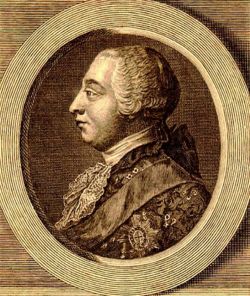
"England's King George III kept a diary. This is what he wrote in it on July 4, 1776: "Nothing of importance happened today."
If King George had put his ear to the ground that day, he surely would have heard a rumble. The earth must have shaken. Because something very important did happen on July 4, 1776."
At the end of the section Hakim discusses how the Revolution will unleash an idea. "The idea is so daring that nothing like it has been heard in governments before. This is it: ordinary people are as worthwhile and valuable and competent as anyone, even as worthwhile as kings and queens. Can you imagine it! No one is better than anyone else. That idea will transform the world."
If King George had put his ear to the ground that day, he surely would have heard a rumble. The earth must have shaken. Because something very important did happen on July 4, 1776."
At the end of the section Hakim discusses how the Revolution will unleash an idea. "The idea is so daring that nothing like it has been heard in governments before. This is it: ordinary people are as worthwhile and valuable and competent as anyone, even as worthwhile as kings and queens. Can you imagine it! No one is better than anyone else. That idea will transform the world."
Friday, January 29th - We started the Earth System unit, so head over to the science tab for updates.
Thursday, January 28th - Earth's Systems is the next topic. We had an overview of the subject and will hit the ground running tomorrow. How did I do on the test? The test went well and we discussed at length where the info came from. How did your child do? Ask them, because I graded the tests last night and returned them. I don't need these back (I have copies). Here is more info than you probably wanted to know about the test (percentage correct for each question...for each class)...
Tuesday, January 26th - Test tomorrow. Your kids should have brought their notebook home with them to study. We reviewed in class, so they should be aware of what to expect. Some students took me up on taking a social studies book home, but only a few took me up on the offer. Don't memorize the whole book or notebook. Just make sure you understand the material.
Monday, January 25th - NO SCHOOL... don't worry... the English Colonies Test will be pushed back to Wednesday.
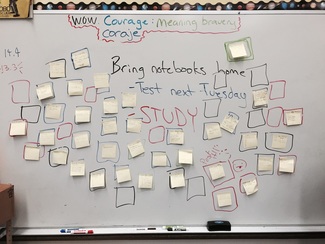
Friday, January 22nd - We learned about our last colony (even though it was the first to be founded)... Virginia. We looked at the new colonial capital of Williamsburg and plantations. We also learned about life on a plantation and how it was run. From the planters to the slaves to the crop buyers. This is a subject that can and should be studied in depth, but that will have to wait a few more years. Test on Tuesday... students should have brought their notebooks home. No need to memorize everything, but they should be familiar with the work. Here are some of the questions that the students came up with for the test...
Click on the picture below for more than you ever wanted to know about colonial jobs...
Click on the picture below for more than you ever wanted to know about colonial jobs...
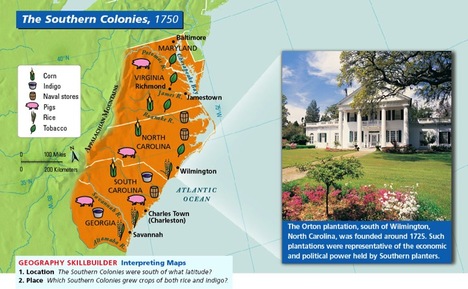
Thursday, January 21st - Lord Proprietors, debtor prisoners and Catholics... What does this have to do with the Southern Colonies? Maybe your child can tell you. The Southern Colonies were created by different people for different reasons, just like the New England and Middle Atlantic.
Don't forget that tomorrow night is Bingo Night!!!
Don't forget that tomorrow night is Bingo Night!!!
Wednesday, January 20th - The students got a better idea what it was like to leave England and start a settlement. We finished our settlement game and the kids couldn't have had more fun. It was interesting to see their reactions to all the different outcomes. Ask your child to tell you about the events that happened on their expedition. Tomorrow we will start journey through the Southern Colonies.
Tuesday, January 19th - Nothing like a quiz to start a short week... the students got to show what they have learned about the Middle Atlantic Colonies. The quiz will be returned tomorrow and added to their notebooks. The quizzes and the notebooks will be their study guide. Before the quiz, we talked about David Bowie (since the kids love space... Space Oddity) and Glen Frey (Stairway to Heaven and the rest of the Eagles greatest hits). That was our background music while the students finished their colonial brochures. A few groups need a little more time, but a good number finished. Here is an example... these are trifold...
Your browser does not support viewing this document. Click here to download the document.

Friday, January 15th - We said goodbye to a friend today. Ollie is moving to New Zealand and today was his last day. We have his email address, so we can stay in touch. We will all miss him and wish him the best. GOOD LUCK!!!
We received some good and bad news today... the MFEE came through on my grant for digital scales - THANKS!!! This is awesome. The students will have the opportunity to work with more advanced equipment and lab work can now be done with extreme accuracy (+/- 0.1 grams).
We received some good and bad news today... the MFEE came through on my grant for digital scales - THANKS!!! This is awesome. The students will have the opportunity to work with more advanced equipment and lab work can now be done with extreme accuracy (+/- 0.1 grams).
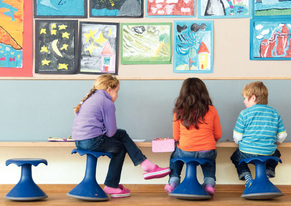
Bad news... no luck on the Hokki Stools. These stools are great ergonomically and help with students who have the need to move. I was looking for only a handful to use at the round table in the middle of the room.
In class, we looked at where the settlers headed once the land near the water was occupied... the back country. Their lives made the earlier colonists lives look easy. It was a hard existence, but they made it work. Those were some very tough people.
We started a game/project today. The students worked in teams to prepare a voyage from England to the New World. It is 1607 and they will build a settlement. We will finish the project next Wednesday and than extend it to Math and ELA. The three classes will bring the project to life using materials that are related to those subjects. It should be really cool!
The school is closed on Monday for Martin Luther King, Jr. Day. The school will be open for a day of service - 10AM - Noon. Lots of interesting booths will be set up and I will be here... what more could you want!
In class, we looked at where the settlers headed once the land near the water was occupied... the back country. Their lives made the earlier colonists lives look easy. It was a hard existence, but they made it work. Those were some very tough people.
We started a game/project today. The students worked in teams to prepare a voyage from England to the New World. It is 1607 and they will build a settlement. We will finish the project next Wednesday and than extend it to Math and ELA. The three classes will bring the project to life using materials that are related to those subjects. It should be really cool!
The school is closed on Monday for Martin Luther King, Jr. Day. The school will be open for a day of service - 10AM - Noon. Lots of interesting booths will be set up and I will be here... what more could you want!
Wednesday, January 13th - We finished our overview of the Middle Atlantic Colonies. Ask your child what New York was called before it was New York (New Amsterdam). How about something that made Peter Stuyvesant unique (not just that he was the director general of New Netherlands, but he had a peg leg with silver nails hammered in). What made Pennsylvania a great choice to pick to live? - (freedom of religion, freedom of speech, freedom of press and trial by jury). How did the civil war in England change the colonies? - (short term - the Restoration brought back a King (King Charles II) and he gave colonies to people that supported him or owed money to) and (long term - showed the colonists that you could live without a king). That and so much more is floating around somewhere inside your kids head!
Monday, January 11th - You have your charter for land in the New World. Now, you need to get people to come and settle, so that you can keep it. What do you do? Hire an agency to create an eye grabbing brochure. The students randomly received a colony and began researching. They need to create a catchy and accurate brochure that will get other English or Europeans to come to that colony. When these are finished, I will post some of the class favorites.
Friday, January 8th - We had a full day! The class started with another of the 101 Things You Should Know About Social Studies. We spend about 5 minutes at the beginning of most classes with a fact. Today was Sparta. The students really loved the mythology from last year and many have read the Percy Jackson books, so they had some background knowledge of Greece and were interested in hearing about the Spartans.
Next... quiz on the New England Colonies. They handled it well and results show that they have been listening and understanding the material. They will get these back on Monday and we will go over each question. They will tape these into their notebooks for future reference.
But wait, there is more... once they finished the quiz, they had to write a letter. Background: They were sent to the colonies (they picked a date between 1680 and 1720) by their families to make a better life and save money to bring their brothers, sisters and parents over. It has been a year since they arrived in the colonies and they are writing home for the firsts time. They needed to work several points into the letter... what colony they live in (or if they have moved and why), what is their job, where do they live, how are they practicing their religion (or not), how are they doing at work, and their name and age. All those answers were up to them. They just had to make sure that what they wrote about was period correct.
We closed the day with a two videos. The kids love Star Wars, so they loved both of these. One is all science. The other is not. After the winter concert, Sylvie played her cello for her class. Off the top of her head she was able to play the Star Wars theme. The second video has to do with that. Here are the links...
Science Wars - https://www.youtube.com/watch?v=LTXTeAt2mpg
Cello Wars - https://www.youtube.com/watch?v=BgAlQuqzl8o
Have a great weekend!
Next... quiz on the New England Colonies. They handled it well and results show that they have been listening and understanding the material. They will get these back on Monday and we will go over each question. They will tape these into their notebooks for future reference.
But wait, there is more... once they finished the quiz, they had to write a letter. Background: They were sent to the colonies (they picked a date between 1680 and 1720) by their families to make a better life and save money to bring their brothers, sisters and parents over. It has been a year since they arrived in the colonies and they are writing home for the firsts time. They needed to work several points into the letter... what colony they live in (or if they have moved and why), what is their job, where do they live, how are they practicing their religion (or not), how are they doing at work, and their name and age. All those answers were up to them. They just had to make sure that what they wrote about was period correct.
We closed the day with a two videos. The kids love Star Wars, so they loved both of these. One is all science. The other is not. After the winter concert, Sylvie played her cello for her class. Off the top of her head she was able to play the Star Wars theme. The second video has to do with that. Here are the links...
Science Wars - https://www.youtube.com/watch?v=LTXTeAt2mpg
Cello Wars - https://www.youtube.com/watch?v=BgAlQuqzl8o
Have a great weekend!
Thursday, January 7th - Wyatt made a profound observation today... The colonies are like a person. In the beginning, they needed England for everything and did whatever England told them to do (like a baby). As the colonies prospered and grew, they began questioning why England got to tell them what to do (teenager). We are not there yet, but he thought the Revolution was a child having enough of a parent telling them what to do (when they are in their 20's).
Homework:
Homework:
| use_a_line_graph-13_colonies-a.pdf | |
| File Size: | 1174 kb |
| File Type: | |
Wednesday, January 6th - The students have completed the overview of the New England Colonies. We have some more work to do, but they should be able to tell you most of the info below...
* The four colonies - Massachusetts, Rhode Island, Connecticut and New Hampshire
* Important people for each colony John Endecott & John Winthrop (MA), Anne Hutchinson & Roger Williams (RI)
and Thomas Hooker - CT
* The differences of the colonies - geography, religion (tolerance), government and climate... to name a few
We still have to learn about the economies and complete a few hands on projects.
* The four colonies - Massachusetts, Rhode Island, Connecticut and New Hampshire
* Important people for each colony John Endecott & John Winthrop (MA), Anne Hutchinson & Roger Williams (RI)
and Thomas Hooker - CT
* The differences of the colonies - geography, religion (tolerance), government and climate... to name a few
We still have to learn about the economies and complete a few hands on projects.
Tuesday, January 5th - We started examining the New England Colonies. Who came to those colonies, why did they come, what did they do when they got there, how did they treat other people, how did it work out for them... these are just a few of the questions that will help the students reach a deeper understanding the topic. If nothing else, they know that New England is NOT A STATE!!!
Monday, January 4th - While a few students finished up a project from science, the others got to jump into our new topic... The 13 Colonies. The students got to try a few different games (facts and geography) and informational sites. You can check them out by hovering over "Social Studies" and clicking on "13 Colonies" from the drop down menu. Or you get click here.
As a class, we looked discussed what countries had colonies in the New World, where they were and how they were doing. We looked at maps of the USA today and the 13 Colonies locations. The students came up with their ideas about why the colonies were not all the same... climate, geography, founders, people...
We finished by reading story about a boy who arrived at Plymouth after a shipwreck. Through his journal, the kids got a feel for what is was like to live at that time. If you ask them, I am sure they will want to tell you about the bathing habits.
As a class, we looked discussed what countries had colonies in the New World, where they were and how they were doing. We looked at maps of the USA today and the 13 Colonies locations. The students came up with their ideas about why the colonies were not all the same... climate, geography, founders, people...
We finished by reading story about a boy who arrived at Plymouth after a shipwreck. Through his journal, the kids got a feel for what is was like to live at that time. If you ask them, I am sure they will want to tell you about the bathing habits.
Monday, November 30th - Check out the science tab...
Wednesday, November 25th - Students from MSU came to perform for your kids today. It was interesting and the students were an excellent audience. In class, we went over the test and performed The Black Mayflower. The students wrote what they were thankful for on the board at the end of class. Can you recognize your child's handwriting? Happy Thanksgiving!
Tuesday, November 24th - One of the students told me that a question on the test was too hard. I was the perfect set up. Once everyone was done with their test, I went through the Post-It note questions that the students wrote and stuck on the wall. They were surprised (and possible pleased) that it was "their" test (I cleaned up the questions). After discussing, the students came to the conclusion that paying attention in class is important and that they all should have taken their notebooks home to review. They were allowed to use their notebooks, but for some it was the first time they had looked at it and that made it more challenging. Tomorrow, I will post the average score and the students will have the tests to take home... just in time for Thanksgiving!
Tomorrow... early dismissal, assembly and Thanksgiving party in Mr. Liddy's homeroom at the end of the day.
Tomorrow... early dismissal, assembly and Thanksgiving party in Mr. Liddy's homeroom at the end of the day.
Monday, November 23rd - It's true, we do have a test tomorrow... but we will get to that later. The students wrapped up their debate prep and we got ready to ruuuummmmblllleeee! There were three groups for and three against, so that worked out nicely. The students who where on the debate team last year were a little more confident, but everyone did a great job. The groups were respectful of each other and the audience (the rest of the students) sat and listened. After each debate, the audience was asked if their opinions had changed because of what they heard. It was interesting to hear what the students found influencing. I thought it went well, but when we wrapped up... the kids asked if we could mix up the order and do it again tomorrow or can we do it with another topic. I call that a success. Now about the test...
No stress. The students wrote questions that they think should be on the test and those are the questions that will be on the test. Everything will come from their notebooks and class discussions, so there is no need to memorize. If your child brought their notebook home, they should read over it. That is about it. If they were absent one day, I will give them a copy of the page from another students notebook. Their grade for The Age of Exploration will be based on their explorer presentation, notebook, historical fiction narrative, Machu Pichu work, class participation and the life in the 1400's piece.
No stress. The students wrote questions that they think should be on the test and those are the questions that will be on the test. Everything will come from their notebooks and class discussions, so there is no need to memorize. If your child brought their notebook home, they should read over it. That is about it. If they were absent one day, I will give them a copy of the page from another students notebook. Their grade for The Age of Exploration will be based on their explorer presentation, notebook, historical fiction narrative, Machu Pichu work, class participation and the life in the 1400's piece.
Friday, November 20th - The English finally figure it out and Jamestown is the first successful colony (English). The students heard the story of the colony and its characters... King James, John Smith, Powhatan, Matoaka (Pocahontas), Lord De la Warr and John Rolfe. On Monday, we will debate if they English were right to come and establish the Jamestown colony. Each group was assigned a point of view that they will defend or oppose in the debate. Here are the sides...
•The shareholders
•The Crown
•The expedition members
•Chief Powhatan
•The clergy
•Those who felt it was wrong
We also heard of few catchy songs this week (topic related) and the students enjoyed signing along. They had so much fun with them, that I don't think they realized that they were reviewing the material!!!
I Can't Wait to Colonize - https://www.youtube.com/watch?v=QsyEGQmcmzE
I'm Spanish and I Know It - https://www.youtube.com/watch?v=EnAxX5IcOOI
Jamestown Colony - https://www.youtube.com/watch?v=sxGvHs9CQkA
Early American Settlement Song - https://www.youtube.com/watch?v=3nZyBifRIvM
•The shareholders
•The Crown
•The expedition members
•Chief Powhatan
•The clergy
•Those who felt it was wrong
We also heard of few catchy songs this week (topic related) and the students enjoyed signing along. They had so much fun with them, that I don't think they realized that they were reviewing the material!!!
I Can't Wait to Colonize - https://www.youtube.com/watch?v=QsyEGQmcmzE
I'm Spanish and I Know It - https://www.youtube.com/watch?v=EnAxX5IcOOI
Jamestown Colony - https://www.youtube.com/watch?v=sxGvHs9CQkA
Early American Settlement Song - https://www.youtube.com/watch?v=3nZyBifRIvM
|
Thursday, November 19th - We finished up our colonization lessons with the English. We learned how Queen Elizabeth, Sir Francis Drake (legal pirate) and Sir Walter Raleigh helped get the English colonizes started... kind of... Roanoke didn't work out, but they would get better.
Some students might tell you that they learned how to make a balloon animal. Yes, that is true, but it was not during class. I showed the students how to make them at indoor recess. Sadly, I do not do parties (ha-ha). |
Wednesday, November 18th - New France has land in the New World, but can't get their people to colonize. King Henry IV decides that he will make this happen (royal colony)... does it work? Not really. In 1712 (about 70 years later), King Louis XIV figures that getting people to settle in the New World is best left to an entrepreneur (proprietary colony). Does it work? Somewhat... by 1754 there are settlements, but only 55,000 colonists. In comparison... the English at the same time have 1,200,000 colonists.
Tuesday, November 17th - New Spain wants to hold onto their lands in the New World. Their best bet... forts, ranches, haciendas, missions and an extensive network of roads. This becomes known as the borderlands (from Florida to California).
Monday, November 16th - The students took a pre-assessment for science on the computers today. This is not something that is graded and goes on a report card or something for the students to worry about. In fact, they were expected to know nothing on the assessment. At the end of the year, they will take it again and we can all see if the students made progress.
After a few minutes (5-10) on the assessment, the students went back to their historical fiction narrative. At the end of class, we discussed what the next few days will look like... settlements in the New World... Spanish, French and English. We will spend a little more time focusing on two of the English settlements - Jamestown and Plymouth.
Picture retakes are tomorrow and next Wednesday is an early dismissal.
After a few minutes (5-10) on the assessment, the students went back to their historical fiction narrative. At the end of class, we discussed what the next few days will look like... settlements in the New World... Spanish, French and English. We will spend a little more time focusing on two of the English settlements - Jamestown and Plymouth.
Picture retakes are tomorrow and next Wednesday is an early dismissal.
Friday, November 13th - Now that the students are familiar with their explorer and the horrors of life on a ship in the 1500-1600's... it is time to put that to use. Language Arts in Social Studies class? The students had to write a narrative/historical fiction that put them on the expedition with their explorer. See below for proof that your kids can do this...
Thursday, November 12th - All done with the presentations and heard a catchy song about the explorers (there is a mistake in there, but catchy no the less)... https://www.youtube.com/watch?v=3521xURSXk8&feature=related . We also found out what the map of the New World looks like by the 1700's. Who claimed what lands and how that will affect the next couple of hundred years.
Wednesday, November 11th - We had a short class today and spent our time discussing Veteran's Day.
Tuesday, November 10th - More presentations... more explorers...
Monday, November 9th - The students shared stories of the long weekends trips to interesting (science or social studies) places. We began presenting the explorers that we researched last week. Some students were nervous and a few asked if they could get out of presenting to the class. Of course I told them.... "no". Better to get practice now in front of kids you have known for 6 years and guess what... everyone survived!
Wednesday, November 4th - Walk-a-Thon!!! The kids were wonderful up at the college. They raised lots of money and collected food for the Human Needs Food Pantry. We walked 4 miles around the campus and than the kids did laps around the field. Every 5 laps was a mile. The highest number I heard was 9 miles. If you travel this long weekend and see anything that is science or history related... take a picture. Email it to me or upload to this site and I will work into a class and your child can talk about it. Have fun!!!
Tuesday, November 3rd - How can you talk about the Renaissance without discussing Michelangelo and da Vinci? We spent a little time looking at this Renaissance men, but than got down to work. We finished up the explorer projects and will begin presenting tomorrow. Speaking of tomorrow... Walk-a-Thon will take place tomorrow morning at Montclair State University. Don't worry about lunch, because we will be back for regular lunch time.
Monday, November 2nd - Explorers!!! The students received an explorer to research and they will present this to the class. It may seem like we are a little off track (this is US History), but we are building a good foundation. How can you learn about the USA without understanding were everyone was coming from and why? Ask your child if they can tell you about their explorer... here they are...
Álvar Núñez Cabeza de Vaca Amerigo Vespucci Christopher Columbus
Ferdinand Magellan Francisco Pizarro Francisco Vasquez de Coronado
Giovanni de Verrazano Henry Hudson Hernando Cortes
Hernando de Soto Jacques Cartier Jean Ribault
John Cabot John Hawkins Juan Ponce de Leon
Juan Rodriguez Cabrillo Leif Ericson Pedro Alvarez Cabral
Pedro Menéndez de Aviles Samuel de Champlain Sir Francis Drake
Sir Walter Raleigh Vasco Nunez de Balboa
Álvar Núñez Cabeza de Vaca Amerigo Vespucci Christopher Columbus
Ferdinand Magellan Francisco Pizarro Francisco Vasquez de Coronado
Giovanni de Verrazano Henry Hudson Hernando Cortes
Hernando de Soto Jacques Cartier Jean Ribault
John Cabot John Hawkins Juan Ponce de Leon
Juan Rodriguez Cabrillo Leif Ericson Pedro Alvarez Cabral
Pedro Menéndez de Aviles Samuel de Champlain Sir Francis Drake
Sir Walter Raleigh Vasco Nunez de Balboa
Friday, October 30th - Party!!! Wait... let's back it up. We found out that King John I of Portugal's dream came true and his people reached Asia by a sea route. I compared the undertaking to that of John Kennedy promising that we would land on the moon before the end of the decade (end of the 60's). It was a process. Small steps that were built upon until Da Gama makes it to India (170 men leave and 55 make it back - not great for 115 sailors, but considered a magnificent success). That triumph propels Portugal to great riches, power and influence. Our take away from this week... the Turks take Constantinople, close down the silk road (all overland trading) and changed the world. Literally, that act changed the world.
Halloween Parade and Party were awesome. The kids (parents and teachers) had fun and got a great start to the weekend. Have a safe and Happy Halloween!!!
Halloween Parade and Party were awesome. The kids (parents and teachers) had fun and got a great start to the weekend. Have a safe and Happy Halloween!!!
Thursday, October 29th - The students began the class by writing about the world in the 1400's. We heard a few examples and than moved on the cause of the European exploration... the Turks' capturing Constantinople and closing down the trade routes with Asia. We practiced our note taking again in this lesson and will finish up tomorrow.
Tomorrow (Friday - October 30th) is our Halloween Parade and Party. The students should bring their costumes with them tomorrow. They can leave it in my class (I will have a safe place ready) or they can leave it in their locker. The parade begins at 2:00. The party will follow. All family are invited to the parade and party. You can sign your child out from the party, so you don't have to wait outside for dismissal. Just an FYI... no weapons (toy guns, swords, light sabers...), no masks that cover the students face and they should be able to get into their costumes on their own (no help from Mr. Liddy or Ms. Cedro).
Get ready to PARTY!!!
Tomorrow (Friday - October 30th) is our Halloween Parade and Party. The students should bring their costumes with them tomorrow. They can leave it in my class (I will have a safe place ready) or they can leave it in their locker. The parade begins at 2:00. The party will follow. All family are invited to the parade and party. You can sign your child out from the party, so you don't have to wait outside for dismissal. Just an FYI... no weapons (toy guns, swords, light sabers...), no masks that cover the students face and they should be able to get into their costumes on their own (no help from Mr. Liddy or Ms. Cedro).
Get ready to PARTY!!!
Wednesday, October 28th - The students understanding of Buzz Aldrin and why it made sense to rename Mt. Hebron was the first 15 minutes of class. The way I see it... he went to school here from k-12 and ended up a spaceman. What better way to say that this school system is great than to have one of our own actually accomplish the impossible... walking on the moon!
We finished up "where the world was in the 1400's"... Americas were isolated and Africa, Asia (not China) and Europe are trading. The Middle East is the hub of the trade routes. Tomorrow we will find out why the fall of Constantinople changed the world.
Homework below is due Friday.
We finished up "where the world was in the 1400's"... Americas were isolated and Africa, Asia (not China) and Europe are trading. The Middle East is the hub of the trade routes. Tomorrow we will find out why the fall of Constantinople changed the world.
Homework below is due Friday.
| Due 10/30 homework - background to european exploration and follow routes on a map.pdf | |
| File Size: | 1829 kb |
| File Type: | |
Tuesday, October 27th - Why did the European explorers explore? Before we get there, we need to understand what was happening around the world in the 1400's. Today, we examined what was happening in the Americas. We got to spend some time looking at Machu Picchu and Hiram Bingham (the man who "revealed" the city to the world). The students thought about what it would be like to have been along side Bingham as he reached the top of the mountain and the first walls appeared from the jungle. The students wrote a about story about this adventure.
Monday, October 26th - The science unit came to an official close today. We went over the Notebook Test (nothing to study, because they used their notebooks)... every question... in detail. We also looked at what a really good notebook looks like. The tests went home and I don't need them back (I have a copy). Your child's grade for science is based on this test, their notebooks and lab/class work. Please feel free to contact me if you have any questions.
We begin the social studies unit... Time of Encounters.
We begin the social studies unit... Time of Encounters.
Monday, September 25th - We finished our Native American tribe projects (there might be a few students who are going to finish at home tonight). The students worked in groups to research a tribe and figure out how to present an overview on a single page... using words and pictures. Tomorrow, head on over to science...
Thursday, September 24th - We started by talking about the passing of Yogi Berra and it led to a few other interesting topics. I also read a paragraph from the Blood of Olympus. I know a lot of the kids had or are reading these books. Why does it matter... ask your kid... it has to do with something we studied last year...
They walked back to the campsite down a two-lane road under the blazing sun. This part of South Carolina seemed to consist mostly of overgrown fields, punctuated by telephone poles and trees covered in kudzu vines. The town of Buford itself was a collection of portable metal sheds – six or seven, which was probably also the town’s population.
We finished our lesson on the Ancient Indians... we learned how the original people lived as hunters and gathers, until about 10,000 years ago... the weather became warmer and drier which lead to the extinction of the large animals (mastodons and mammoths) that hunted. Around 5,000 years ago, they developed a bow and arrow and began farming, which led the end of their nomadic lifestyle. This was the beginning of the ancient civilizations. We looked at the Olmec, Aztec, Mound Builders and Anasazi to see how they lived and tried to figure where they went. We ended the lesson with these civilizations around 1400AD giving rise to 100's tribes.
We ended the class by pairing off and discussing our last project for this unit. Each team (student picked a partner) picked the name of a tribe out of a bucket. Tomorrow, they will begin their research and think about how they will present it... they can write an essay or use pictures and captions. I am looking for a brief overview that will be printed and placed in a binder. This will be available to the class to look through when they have extra time. All three classes have different tribes, so we should end up with a good mix from different regions.
They walked back to the campsite down a two-lane road under the blazing sun. This part of South Carolina seemed to consist mostly of overgrown fields, punctuated by telephone poles and trees covered in kudzu vines. The town of Buford itself was a collection of portable metal sheds – six or seven, which was probably also the town’s population.
We finished our lesson on the Ancient Indians... we learned how the original people lived as hunters and gathers, until about 10,000 years ago... the weather became warmer and drier which lead to the extinction of the large animals (mastodons and mammoths) that hunted. Around 5,000 years ago, they developed a bow and arrow and began farming, which led the end of their nomadic lifestyle. This was the beginning of the ancient civilizations. We looked at the Olmec, Aztec, Mound Builders and Anasazi to see how they lived and tried to figure where they went. We ended the lesson with these civilizations around 1400AD giving rise to 100's tribes.
We ended the class by pairing off and discussing our last project for this unit. Each team (student picked a partner) picked the name of a tribe out of a bucket. Tomorrow, they will begin their research and think about how they will present it... they can write an essay or use pictures and captions. I am looking for a brief overview that will be printed and placed in a binder. This will be available to the class to look through when they have extra time. All three classes have different tribes, so we should end up with a good mix from different regions.
Monday, September 21st - Now that the students have become reacquainted with our geography, we were able to start looking at the early Americans. Where did they come from? We explored three theories... Land Bridge, Early Arrival and Origin Stories. We started by looking back to where we came from and how we spread across Africa, Middle East, Europe, Asia and Australia. Through class discussions, the students came up with all three theories. We even heard the origin story of the Blackfoot people. We than looked at maps to help understand the movements.
Thursday, September 18th - The students gave their presentations today. Some were very good and some could have used a little more attention. Since it was our first presentation this year, we reviewed each topic and talked about what could have made the lesson better for the class. It is a learning process or a marathon and not a sprint. Either way, we will keep working on this skill.
Wednesday, September 16th - The groups worked on their presentations during class. They will spend a few minutes tomorrow putting the finishing touches on their work. Then the fun (presentation) begins...
Tuesday, September 15th - 104 years ago yesterday, President McKinley died from an assassins bullet and Theodore Roosevelt become president of the United States. We spent a few minutes talking about the effects of that incident and how the consequences make a differences in the students lives. Hopefully, we are using our background knowledge and building connections!
The groups started their presentation projects. Before we get into the original people and settlers, we need to make sure that we understand the geography of the USA. This should be a refresher from previous years, so we will only spend a couple of days. Each group (4 students to a group) was given material to cover will be create a presentation and teach the rest of the class. Understanding geography will help the students appreciate why people lived the way they did in the places they choose.
The groups started their presentation projects. Before we get into the original people and settlers, we need to make sure that we understand the geography of the USA. This should be a refresher from previous years, so we will only spend a couple of days. Each group (4 students to a group) was given material to cover will be create a presentation and teach the rest of the class. Understanding geography will help the students appreciate why people lived the way they did in the places they choose.
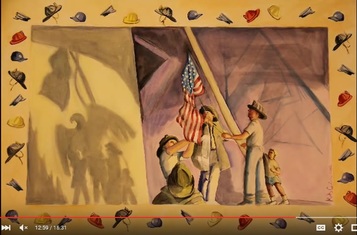
Friday, September 11th - We started the day by reading The Little Chapel That Stood by A.B. Curtiss. The story is about the historic St. Paul's Chapel/Trinity Church that stood less than 100 yards from the Twin Towers and miraculously survived on 9-11. It is a good and appropriate story for elementary students that focuses on the being able to find comfort in even the worst of times. The Church helped the force that cleared the wreckage to go on by staying open around the clock for construction workers, firefighters, police officers and others who descended on the smoldering site. It served as a place for workers to rest, get something to eat or drink or just sit in a place that was quiet and clean. We talked about how anyone can have a bad day or go through a difficult times, but we all have something that we can turn to and feel safe.
We finished or prep work for social studies by talking about what "social studies" is and why it is important. We also looked at primary and secondary sources to help us better understand and analyze where our history comes from.
We finished or prep work for social studies by talking about what "social studies" is and why it is important. We also looked at primary and secondary sources to help us better understand and analyze where our history comes from.
Thursday, September 10th - We spent the beginning of the class learning about sulfur miners. This was a mix of reading, writing, science (elements and geosphere) and social studies (people and economics). The bulk of the class was spent looking at and discussing maps and geography, so that we will be better prepared to understand our unit on early Americans. The students did not just look at maps that you are familiar with, but other styles of maps that they had to think about why they looked different. We looked at Pacific-Centered, Population, Icosahedron (20 triangles)...
Your browser does not support viewing this document. Click here to download the document.


